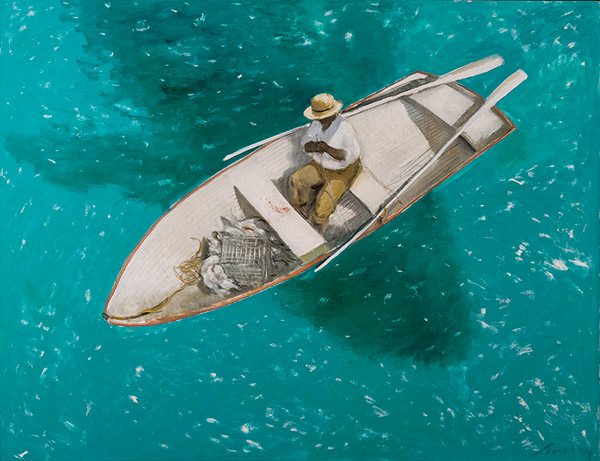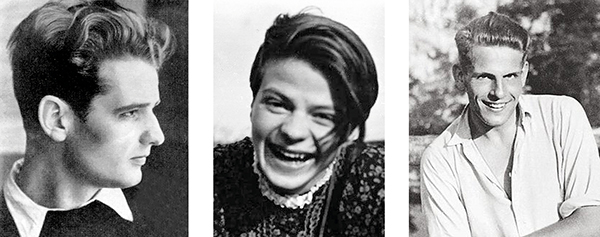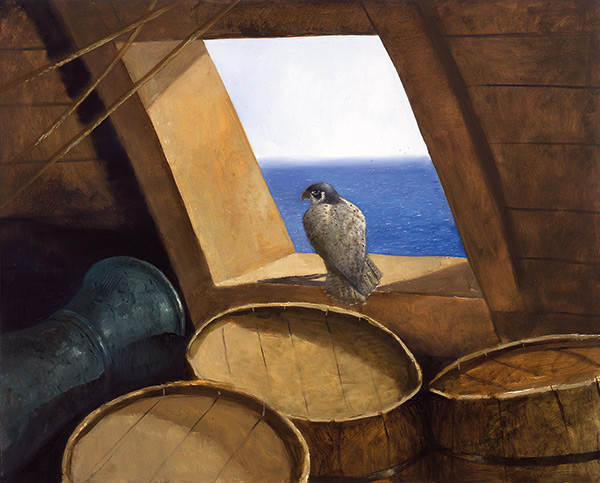Subtotal: $
Checkout-

Recovering from Heroin and Fiction
-

The Workers and the Church
-

The Body She Had
-

Encounters at the Southern Border
-

A Lion in Phnom Penh
-

Become Slaves to One Another
-

Form and Freedom
-

Paraguayans Don’t Read
-

The Bible’s Story of Freedom
-

The Autonomy Trap
-

An Exodus From China
-

Yearning for Freedom
-

Taking Lifelong Vows
-

Poem: “And Is It Not Enough?”
-

An American Mother Forgives
-

I Cheerfully Refuse Despair
-

The Glory of God Is a Human Being Fully Alive
-

Arvo Pärt’s Journey
-

Readers Respond
-

The Forgiveness Project
-

Humanizing Medicine
-

The Busted Bean
-

Jakob Hutter, Radical Reformer
-

Covering the Cover: Freedom
-

Disciplines for Freedom
-

The Open Road
-

We Are All Fiddlers on the Roof
-

Bad Faith or Perfect Freedom
-

American Freedom and Christian Freedom
-

Jane Eyre Holds Her Own
-

Becoming a Free Person

In Defiance of All Powers
What’s the point of freedom?
By Peter Mommsen
September 18, 2024
Available languages: Español
“Freedom!” was what Hans Scholl and two fellow students painted on walls around Munich during the night of February 3, 1943. The three friends, all in their twenties, were members of the anti-Nazi movement known as the Weiße Rose or White Rose. They painted the word freehand, three feet high, using tar-based black paint that would be tough to scrub away. For their other slogans – “Down with Hitler” and “Hitler the Mass Murderer” – they used stencils. Two of them did the work while the third stood guard with a pistol.
Since the summer before, Hans Scholl and other members of the White Rose had been writing and distributing illegal leaflets that demanded, “Freedom! Freedom! Freedom!” These short manifestos condemned “National Socialist subhumanism,” decried the war and the German extermination campaign against Poland’s Jews, and called for resistance and sabotage. By this point, the group had access to a duplicating machine and was anonymously distributing thousands of copies in public places and by mail, as well as through their networks in other cities. Hans Scholl served in the army as a medic during academic breaks, and had seen firsthand the horrors of the Eastern Front. The midnight graffiti campaign was the White Rose’s response to Germany’s loss of its Sixth Army at Stalingrad, where at least 1.2 million people, including 200,000 German soldiers, had died.
On a morning two weeks later, Hans and his twenty-one-year-old sister, Sophie, set out to distribute the White Rose’s sixth and last leaflet on the University of Munich campus. “Fellow Students!” it began. “Devastated, our nation stands before the downfall of the men of Stalingrad. … The day of reckoning has come, the reckoning of our German youth with the most despicable tyranny ever endured by our nation. In the name of all German youth, we demand from Adolf Hitler’s state our personal freedom…. Our nation is on the verge of rising up against the enslavement of Europe through National Socialism, in the new, devoutly believing breakthrough of freedom and honor!”

Julio Larraz, The Big Fish, oil on canvas, 2009. Reproduced with permission of Julio Larraz and Havoli Fine Art Management, Inc.
When they had placed most of their 1,500 leaflets in stacks around campus, Sophie, on impulse, tossed a pile of copies down from the balustrade in the atrium of a university hall. A janitor saw her, locked the building, and called the police. She and Hans were arrested by the Gestapo on the spot. He remembered too late that his pocket contained the draft of a seventh leaflet by his friend Christoph Probst. The Gestapo seized Probst, also a student and a father of three, shortly afterward. Four days after the initial arrest, the three were condemned to death for treason in a two-hour trial and executed. (Other White Rose members, including Hans’s fellow graffitists Willi Graf and Alexander Schmorell, would be executed over the following months.) In court, Hans Scholl insisted that he had acted freely: “I knew what I took upon myself and I was prepared to lose my life by so doing.”
In this year’s presidential election contest in the United States, both candidates have made much of the word freedom. “We choose freedom,” Kamala Harris announced in her first campaign video, vowing to protect access to abortion, combat gun violence, fight poverty, and ensure that “no one is above the rule of law”; Beyoncé’s “Freedom,” a favorite song at Harris rallies, is the video’s soundtrack. Donald Trump, meanwhile, promises in his platform to defend “our fundamental freedoms, including freedom of speech, freedom of religion, and the right to keep and bear arms.” He has spoken of building ten new “freedom cities” that are exempt from government regulations.
Clearly, “freedom” can mean many things, not all of them compatible with each other. Both candidates’ appeals to freedom, all the same, do share a common core in asserting the American ideal of self-determination. But self-determination for what? Which kinds of freedom might be worth dying for?
We moderns tend to understand freedom as being defined in the negative: not being dominated. Freedom means chains being broken, slaves being emancipated, oppressors and busybodies losing their power. It is liberation from tyrannical governments, self-aggrandizing elites, and the enforcers of strict social codes.
This kind of freedom lies at the heart of liberal democracy, rooted in the Enlightenment. It is the grand theme of the French Revolution’s Declaration of the Rights of Man and of the Citizen, drafted in 1789 by the Marquis de Lafayette with help from Thomas Jefferson: “Men are born free and equal in rights.… Liberty consists in being able to do anything that does not harm others.”
These ringing words, which would prove massively influential in the development of “free” societies, have an undoubted majesty. As a political ideal, they accord with, and arguably derive from, Christianity’s teaching that each human being is created in the image of God, whose very essence (according to the New Testament) is freedom. To be a human being, then, simply is to be born free. As Jefferson had put it thirteen years earlier in the American Declaration of Independence, it means possessing an “unalienable right” to liberty as a gift of humankind’s Creator.
It was in the name of this revolutionary freedom that the White Rose resisted the “enslavement of Europe.” Their leaflets called for the civil liberties that are foundational to liberal democracy, including freedom of speech and religion, academic freedom, and “freedom of the individual citizen from despotism.”
But this kind of freedom is incomplete. Though Hans and Sophie Scholl risked their lives for it, they recognized that political freedom, on its own, remains impoverished. Influenced by Catholic mentors such as Carl Muth and Theodor Haecker, they had immersed themselves in the writings of Augustine and Aquinas. From them, they had learned a vision of freedom that was deeper, richer, and more ancient.
Freedom, according to these thinkers, is not only freedom from external domination or constraint. Equally important is freedom to: our internal capacity to act. This requires self-rule, self-mastery, the overcoming of the divided will, of akrasia, as Greek philosophers and the Bible call it. This freedom can’t be granted to a person by a government or anyone else, but must be cultivated in one’s own life.

Hans Scholl, Sophie Scholl, and Christoph Probst. Hans Scholl, ca. 1940. Used by permission from akg-images / Interfoto. Sophie Scholl, photograph © 2024 by Manuel Aicher, Rotis, Germany. Used by permission. Christoph Probst, photograph by Gedenkstätte Widerstand. Used by permission from Weisse Rose Institut e.V.
Since for many people today this kind of freedom is no longer intuitive, it can be useful to consider an example. Take a skillful violinist playing a Bach partita. His freedom to play is found in the very act of playing. This freedom doesn’t come from external circumstances – say, not being handcuffed, having the political right to make music, or owning an instrument. Instead, as my teenage son is now tired of hearing because he just wants to go fishing, freedom to play the violin comes from commitment. It is won through submitting oneself to what may initially seem like freedom’s opposite: lessons, practice, discipline. The renowned conductor Serge Koussevitzky, though he was remembered by his protégé Leonard Bernstein as “a very kind, gentle man,” used to tell players, “You must suffer. Why don’t you suffer more? Only then will the music be beautiful.”
In his letters, Hans Scholl describes “moral” or “spiritual” freedom, a freedom that doesn’t depend on external circumstances, including the political regime in which one lives. As he wrote in his diary in August 1942 while on the Russian front: “I know how limited human freedom is, but man is essentially free, and it is his freedom that renders him human.” This essential freedom is a way of being that one can make one’s own “in defiance of all powers” – words from a Goethe poem about freedom that the Scholl family used as a motto. Or as Hans put it in what can be taken as his guiding principle: “Live life to the full, or not at all.”
How can a person gain this freedom? In his 1996 novel Infinite Jest, David Foster Wallace describes one way. The book chronicles the lives of characters variously addicted to sports, chemicals, entertainment, and sex. One of these is Don Gately, a resident at an Alcoholics Anonymous rehab house in Boston. He struggles with the akrasia of a substance abuser: “Why can’t I quit when I so want to quit?”
It’s suggested in the 3rd of Boston AA’s 12 Steps that you turn your Diseased will over to the direction and love of ‘God as you understand Him.’ It’s supposed to be one of AA’s major selling points that you get to choose your own God. You get to make up your own understanding of God or a Higher Power or Whom-/Whatever.… You might think it’d be easier if you Came In with 0 in the way of denominational background or preconceptions, you might think it’d be easier to sort of invent a Higher-Powerish God from scratch and then like erect an understanding, but Don Gately complains that this has not been his experience thus far. His sole experience so far is that he takes one of AA’s very rare specific suggestions and hits the knees in the AM. and asks for Help and then hits the knees again at bedtime and says Thank You, whether he believes he’s talking to Anything/-body or not, and he somehow gets through that day clean.
For Gately, AA’s prescriptions work, as he finds after several months in the program:
He had nothing in the way of a like God-concept, and at that point maybe even less than nothing in terms of interest in the whole thing; he treated prayer like setting an oven-temp according to a box’s direction. Thinking of it as talking to the ceiling was somehow preferable to imagining talking to Nothing. And he found it embarrassing to get down on his knees in his underwear, and like the other guys in the room he always pretended his sneakers were like way under the bed and he had to stay down there a while to find them and get them out, when he prayed, but he did it, and beseeched the ceiling and thanked the ceiling, and after maybe five months Gately … all of a sudden realized that quite a few days had gone by since he’d even thought about Demerol or Talwin or even weed. Not just merely getting through those last few days – Substances hadn’t even occurred to him. I.e. the Desire and Compulsion had been Removed. More weeks went by, a blur of Commitments and meetings and gasper-smoke and clichés, and he still didn’t feel anything like his old need to get high. He was, in a way, Free. It was the first time he’d been out of this kind of mental cage since he was maybe ten. He couldn’t believe it.
For Gately – as for countless nonfictional participants in twelve-step programs ever since AA’s founding in 1935 – freedom arrives paradoxically: through submitting to Another.
David Foster Wallace’s views on religion were complicated. But as many of his readers have noted, his portrayal of Gately’s recovery echoes a central New Testament text on freedom. (This is hardly coincidental, because real-life Alcoholics Anonymous, though not religiously affiliated, originally emerged from the Oxford Group, a Christian revivalist movement.) In his Letter to the Romans, the apostle Paul struggles with the same dilemma that drove Gately to rehab: Why can’t I quit when I so want to quit?
I have the desire to do what is right, but not the ability to carry it out. For I do not do the good I want, but the evil I do not want is what I keep on doing.… For I delight in the law of God, in my inner being, but I see in my members another law waging war against the law of my mind and making me captive to the law of sin that dwells in my members. Wretched man that I am! Who will deliver me from this body of death? (Rom. 7:18–19, 22–24)
To put it anachronistically, for Paul the “law of sin” is a kind of addiction. It deprives us of our unalienable birthright of freedom, robbing us of our capacity to do what we truly want. Liberation from this “slavery” requires the first two of the twelve steps: honesty about one’s own powerlessness, and turning to a Higher Power for help. As he describes the means of recovery: “Thanks be to God, that you who were once slaves of sin have become obedient from the heart to the standard of teaching to which you were committed, and, having been set free from sin, have become slaves of righteousness” (Rom. 6:17–18).
In Paul’s view, we will be free not when we choose whatever we might happen to desire, but when we will as God wills – that is, when we love, in the sense of Jesus’ two great commandments to love God with heart, soul, mind, and strength, and to love our neighbor as ourselves. Augustine later condensed these insights into his famous aphorism: “Love and do what you will.” As felt in the soaring notes of a violin, this kind of commitment expands, rather than limits, our souls.
It’s remarkable how explicitly the members of the White Rose, even while defending political liberty, emphasized freedom’s spiritual roots in ways that echo the New Testament. Their fourth leaflet diagnoses the evil of National Socialism as a kind of addiction – one bad choice leading to a loss of the ability to quit – and seems to suggest that the cure requires the intervention of a Higher Power:
Everywhere and at all times demons have been lurking in the dark, waiting for the moment when man is weak; when of his own volition he leaves his place in the order of creation as founded for him by God in freedom; when he yields to the force of evil, separates himself from the powers of a higher order; and, after voluntarily taking the first step, he is driven on to the next and the next at a furiously accelerating rate. Everywhere and at all times of greatest trial people have appeared, prophets and saints who cherished their freedom, who preached the one God and who with his help brought the people to a reversal of their downward course. Man is free, to be sure, but without the true God he is defenseless against the principle of evil.
Even in political affairs, the leaflet argues, freedom is not achieved purely by our own efforts. It comes as a gift from a Giver, who calls for our free obedience in return. As Augustine and Aquinas had taught, the closer we come to the Giver of freedom – the more we love what he loves and will what he wills – the freer we become.
This kind of freedom doesn’t depend on a political order or even one’s physical liberty. It’s possible even in a prison cell.
After their brief trial on the morning of February 22, 1943, Hans Scholl, Sophie Scholl, and Christoph Probst heard their death sentence at 12:45 p.m. The authorities in Berlin were eager for the sentence to be carried out that same day. The local Gauleiter commissioned a carpenter to build gallows for a public hanging, but was overridden by Heinrich Himmler, who worried about making the students into martyrs.
In prison, where they spent their last three hours, Christoph received baptism and communion from a Catholic priest. Hans and Sophie wanted to do the same, but held back out of respect for their devoutly Lutheran mother, and instead received communion from the Protestant prison pastor.

Julio Larraz, Falcon Aboard, oil on canvas, 2000. Reproduced with permission of Julio Larraz and Havoli Fine Art Management, Inc.
At four o’clock, the three were informed that a final appeal for clemency had been denied, and that the execution would be at five.
Shortly beforehand, the prison guards waived their own rules and allowed the three to share a last cigarette. The Scholl siblings had been able to say farewell to their parents. Christoph, whose wife was unaware of her husband’s fate (she was in hospital with childbed fever), now knew that he would never see his four-week-old daughter. All the same, he seems to have been at peace. When it was time to say goodbye, the guards would later recall him saying to the others, “In a few minutes we’ll see each other again in eternity.”
Sophie was taken to the guillotine first; Christoph was to be last. Two minutes after she had gone, the guards came for Hans. The official record of execution notes that the time elapsed between removal from the cell and death was fifty-two seconds and that “the condemned was tranquil and composed.” It adds: “His last words were, ‘Long live freedom!’”
The previous October, Sophie, in a letter to a friend, sketched out her own sense of what freedom is for. We are, she suggested, to use the freedom the Creator has given us to choose the beauty of his plan for ourselves and for the world. Despite the horrors of human history, she was confident this plan would prevail:
Isn’t it mysterious – and frightening, too, when one doesn’t know the reason – that everything should be so beautiful in spite of the terrible things that are happening? My sheer delight in all things beautiful has been invaded by a great unknown, an inkling of the Creator whom his creatures glorify with their beauty. – That’s why man alone can be ugly, because he has the free will to disassociate himself from this song of praise. Nowadays one is often tempted to believe that he’ll drown the song with gunfire and curses and blasphemy. But it dawned on me last spring that he can’t, and I’ll try to take the winning side.
Already a subscriber? Sign in
Try 3 months of unlimited access. Start your FREE TRIAL today. Cancel anytime.











































Mark Vanskiver
Wonderful article, Peter. Thank you for your insight to what true freedom looks like. I agree ... Where the spirit of the Lord is, there is freedom (see 2 Corinthians 3:17). In this present age, the deeper our allegiance to the Creator of the universe, the deeper our freedom in a broken world—freedom to discern God’s will and live peaceful, respectful, law-abiding lives in the name of Jesus, at whatever the cost, come what may (see Titus 2:12). George MacDonald would tell us that true freedom is found in willing the will of God, “which lies at our root, and is the vital power of our existence.” - Mark VanSkiver